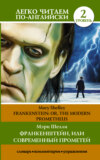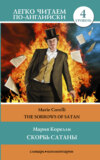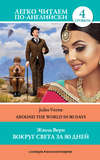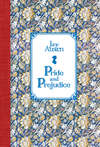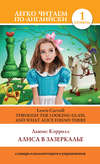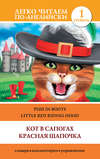Kitabı oku: «Вокруг света за 80 дней / Around the World in Eighty Days», sayfa 2
Chapter IX
The distance between Suez and Aden is precisely thirteen hundred and ten miles. Many passengers from Brindisi were going to Bombay, others for Calcutta. Phileas Fogg seldom went upon the deck, and he played whist. Passepartout escaped sea-sickness, and rather enjoyed the voyage.
“Oh,” said Passepartout when he approached, “you are the gentleman who met me at Suez?”
“Ah! I quite recognise you. You are the servant of the strange Englishman.”
“Just so, monsieur…”
“Fix.”
“Monsieur Fix,” resumed Passepartout, “Where are you going?”
“Like you, to Bombay.”
“That’s great! Do you know India?”
“Yes,” replied Fix, who spoke cautiously.
“A curious place, this India?”
“Oh, very curious. Mosques, minarets, temples, fakirs, pagodas, tigers, snakes, elephants! And how is Mr. Fogg?” asked Fix.
“Quite well, and I too.”
“But I never see your master on deck.”
After this meeting, Passepartout and Fix talked much. Meanwhile the Mongolia went rapidly, and instead of the 15th, arrived to Aden on the evening of the 14th. Mr. Fogg and his servant went ashore at Aden to visa the passport. Fix followed them. Then Mr. Fogg returned on board. Passepartout sauntered about among the mixed population of Somalis, Banyans, Parsees, Jews, Arabs, and Europeans.
“Very curious, very curious,” said Passepartout to himself.
On Sunday, October 20th, towards noon, they saw the Indian coast. The Mongolia was at Bombay on the 20th.
Chapter X
India embraces fourteen hundred thousand square miles, its population is one hundred and eighty millions people. But British India only embraces seven hundred thousand square miles, and its population is from one hundred to one hundred and ten millions of inhabitants. A considerable portion of India is still free from British authority; and there are certain ferocious rajahs who are absolutely independent.
The passengers of the Mongolia went ashore at half-past four p.m. At eight the train will start for53 Calcutta. Mr. Fogg left the steamer, gave his servant several errands and directed his steps to the passport office. He did not care for the wonders of Bombay-its famous city hall, its splendid library, its forts and docks, its bazaars, mosques, synagogues, its Armenian churches, and the noble pagoda on Malabar Hill54.
Then Phileas Fogg repaired quietly to the railway station, where he ordered dinner. Among the dishes, the landlord especially recommended a “native rabbit”. Mr. Fogg accordingly tasted the dish, but found it horrible. He rang for the landlord, and, on his appearance, said,
“Is this rabbit, sir?”
“Yes, my lord,” the rogue boldly replied, “rabbit from the jungles.”
“And this rabbit did not mew when they killed it?”
“Mew, my lord! What, a rabbit can’t mew! I swear to you…”
“Landlord, remember this: in India, cats were sacred animals. That was a good time.”
“For the cats, my lord?”
“Perhaps for the travelers as well!”
Fix went on shore shortly after Mr. Fogg. His first destination was the Bombay police. He nervously asked if a warrant arrived from London. It did not reach the office. Fix was disappointed, and tried to obtain an order of arrest from the director of the Bombay police. The director refused.
Passepartout, however, purchased shirts and shoes and took a leisurely promenade about the streets. It was the day of a Parsee festival55. These descendants of the sect of Zoroaster56 were celebrating a religious carnival, with processions and shows.
Unhappily for his master, Passepartout’s curiosity drew him very far. He saw the splendid pagoda on Malabar Hill. He was quite ignorant that it is forbidden to Christians to enter certain Indian temples, and that even the faithful must go in without their shoes.
Passepartout, however, went in like a simple tourist. He admired the splendid Brahmin ornamentation, but suddenly found himself on the sacred floor. He beheld three enraged priests, who tore off his shoes, and began to beat him with loud, savage exclamations. The agile Frenchman was soon upon his feet again, and ran away. Of course, he lost his package of shirts and shoes.
At five minutes before eight, Passepartout, hatless, shoeless rushed breathlessly into the station. Fix, who followed Mr. Fogg and saw that he was really going to leave Bombay, was there, upon the platform. He resolved to follow the supposed robber to Calcutta, and farther, if necessary. Passepartout did not observe the detective, who stood in an obscure corner.
“I hope that this will not happen again,” said Phileas Fogg coldly, as he got into the train.
Poor Passepartout followed his master without a word. Fix wanted to enter another carriage, when an idea came to him.
“No, I’ll stay,” muttered he.
Just then the locomotive gave a sharp screech, and the train passed out into the darkness of the night.
Chapter XI
There were many officers, government officials, and opium and indigo merchants among the passengers. They all went to the eastern coast. Passepartout rode in the same carriage with his master, and a third passenger occupied a seat57 opposite to them. This was Sir Francis Cromarty58, one of Mr. Fogg’s whist partners on the Mongolia. He wanted to join his corps at Benares59. Sir Francis was a tall, fair man of fifty. He made India his home. He was almost familiar with the customs, history and character of India and its people. But Phileas Fogg did not inquire into these subjects.
Sir Francis Cromarty observed the oddity of his companion. Phileas Fogg did not conceal from Sir Francis his plan, nor all the circumstances. The general saw in the wager a useless eccentricity and a lack of common sense.
Passepartout did not realise that he was actually crossing India in a railway train. The travelers crossed the country of the goddess Kali60. Not far off rose Ellora61, with its graceful pagodas, and the famous Aurungabad62.
At half-past twelve the train stopped at Burhampoor63 where Passepartout was able to purchase some Indian slippers, ornamented with false pearls.
At eight o’clock the train stopped in the midst of a glade – fifteen miles beyond Rothal, where there were several bungalows, and workmen’s cabins. The conductor shouted,
“Passengers will get out here!”
Phileas Fogg looked at Sir Francis Cromarty for an explanation; but the general did not tell what that meant. Passepartout rushed out and speedily returned. He cried,
“Monsieur, no more railway!”
“What do you mean?” asked Sir Francis.
“I mean to say that the train isn’t going on.”
The general stepped out, while Phileas Fogg calmly followed him. They proceeded together to the conductor.
“Where are we?” asked Sir Francis.
“At the hamlet of Kholby64.”
“Do we stop here?”
“Certainly. The railway isn’t finished.”
“What! not finished?”
“No. There’s still fifty miles from here to Allahabad, where the line begins again.”
“But the papers announced the railway.”
“So what, officer? The papers were mistaken.”
“Yet you sell tickets from Bombay to Calcutta,” retorted Sir Francis.
“No doubt65,” replied the conductor; “but the passengers know that they must provide means of transportation for themselves from Kholby to Allahabad.”
Sir Francis was furious. Passepartout did not dare to look at his master.
“Sir Francis,” said Mr. Fogg quietly, “we will, if you please, look about for some means of conveyance to Allahabad.”
“Mr. Fogg, what a delay!”
“No, Sir Francis; it’s nothing.”
“What! You knew that the way…”
“Not at all; but I know that some obstacle or other will sooner or later arise on my route. Nothing, therefore, is lost. I have two days to sacrifice. A steamer leaves Calcutta for Hong Kong at noon, on the 25th. This is the 22nd, and we shall reach Calcutta in time.”
Many travelers were aware of this interruption, and they began to engage wagons, carriages, palanquins, ponies, and so on. Mr. Fogg and Sir Francis Cromarty did not find anything.
“I shall walk,” said Phileas Fogg.
Passepartout said,
“Monsieur, I think I found something.”
“What?”
“An elephant! An elephant that belongs to an Indian who lives a hundred steps from here.”
“Let’s go and see the elephant,” replied Mr. Fogg.
They soon reached a small hut. An Indian came out of the hut. His elephant was half domesticated. Kiouni66-this was the name of the beast-could travel rapidly for a long time. Mr. Fogg resolved to hire him. But elephants are not cheap in India. When Mr. Fogg proposed to the Indian to hire Kiouni, he refused. Mr. Fogg persisted. Ten pounds an hour for the loan of the beast to Allahabad? Refused. Twenty pounds? Refused also. Forty pounds? Still refused.
Phileas Fogg then proposed to purchase the animal, and at first offered a thousand pounds for him. The Indian still refused. His small, sharp eyes were glistening with avarice. Mr. Fogg offered first twelve hundred, then fifteen hundred, eighteen hundred, two thousand pounds. At two thousand pounds the Indian yielded.
“What a price, good heavens!” cried Passepartout, “for an elephant.”
It only remained now to find a guide, which was easy. A young Parsee, with an intelligent face, offered his services, which Mr. Fogg accepted. The Parsee, a good elephant driver, covered the elephant’s back with a saddle-cloth, and attached to each of his flanks some uncomfortable howdahs. Phileas Fogg paid the Indian with some banknotes which he extracted from the famous carpet-bag.
They purchased provisions at Kholby. The Parsee perched himself on the elephant’s neck, and at nine o’clock they left the village. The animal marched through the dense forest of palms.
Chapter XII
At eleven o’clock the guide stopped the elephant, and gave it an hour for rest. Neither Sir Francis nor Mr. Fogg regretted the delay.
At noon the Parsee gave the signal of departure. The travelers several times saw bands of ferocious Indians. The Parsee avoided them as much as possible. But what will Mr. Fogg do with the elephant when he gets to Allahabad? Will he carry it on with him? Impossible! The cost will be very expensive. Will he sell it, or set it free?
The night was cold. The Parsee lit a fire in the bungalow with a few dry branches. The warmth was very grateful. The travelers ate their supper ravenously.
At six o’clock in the morning they woke up. The guide hoped to reach Allahabad by evening. The guide avoided inhabited places. Allahabad was now only twelve miles to the north-east. They stopped under a clump of bananas, the fruit of which was as healthy as bread and as succulent as cream.
At two o’clock the guide entered a thick forest. The elephant suddenly stopped. It was then four o’clock.
“What’s the matter?” asked Sir Francis.
“I don’t know, officer,” replied the Parsee.
He listened attentively to a murmur which came through the thick branches. The murmur soon became more distinct. It now seemed like a distant concert of human voices with brass instruments. Mr. Fogg patiently waited without a word. The Parsee jumped to the ground, fastened the elephant to a tree. He soon returned:
“A procession of Brahmins is coming this way. We must go aside, if possible.”
The guide unloosed the elephant and led him into the wood. The discordant tones of the voices and instruments drew nearer, and the songs mingled with the sound of the tambourines and cymbals. The head of the procession soon appeared beneath the trees, a hundred paces away. The strange figures who performed the religious ceremony were among the branches. First came the priests, in long robes, with mitres on their heads. Men, women, and children surrounded them. They sang a lugubrious psalm and played tambourines and cymbals. Behind them there was a car67 with large wheels. The spokes of the car represented serpents. Upon the car, stood a hideous statue with four arms, red body, haggard eyes, dishevelled hair, and protruding tongue.
Sir Francis recognised the statue and whispered,
“The goddess Kali; the goddess of love and death.”
“Of death, perhaps,” muttered Passepartout, “but of love-that ugly old hag? Never!”
A group of old fakirs made a wild ado round the statue. Some Brahmins led a woman who faltered at every step. This woman was young, and as fair as a European. Her head and neck, shoulders, ears, arms, hands, and toes were loaded down with jewels and gems with bracelets, earrings, and rings. She had a light muslin robe on.
The guards who followed the young woman were bearing a corpse on a palanquin. It was the body of an old man. Next came the musicians. Sir Francis watched the procession with a sad countenance, and said,
“A suttee68.”
The Parsee nodded, and put his finger to his lips. The procession slowly wound under the trees, and soon its last ranks disappeared in the depths of the wood. The songs gradually died away. Phileas Fogg asked:
“What is a suttee?”
“A suttee,” returned the general, “is a human sacrifice, but a voluntary one. This woman will be burned tomorrow at the dawn of day.”
“Oh, the scoundrels!” cried Passepartout.
“And the corpse?” asked Mr. Fogg.
“It is the prince, her husband,” said the guide; “an independent rajah of Bundelcund69.”
“Is it possible,” resumed Phileas Fogg, “that these barbarous customs still exist in India, and that the English are unable to stop them?”
“These sacrifices do not occur in the larger portion of India,” replied Sir Francis; “but we have no power over these savage territories, and especially here in Bundelcund.”
“The poor wretch!” exclaimed Passepartout, “they will burn her alive!”
“Yes,” returned Sir Francis, “alive. And the sacrifice that will take place tomorrow at dawn is not a voluntary one.”
“How do you know?”
“Everybody knows about this affair in Bundelcund.”
“But the wretched creature did not resist,” observed Sir Francis.
“That was because they intoxicated her with fumes of hemp and opium.”
“But where are they taking her?”
“To the pagoda of Pillaji70, two miles from here; she will pass the night there.”
“And the sacrifice will take place…”
“Tomorrow, at the first light of dawn.”
The guide wanted to urge Kiouni forward with a peculiar whistle. But Mr. Fogg stopped him, and turned to Sir Francis Cromarty,
“Let’s save this woman.”
“Save the woman, Mr. Fogg!”
“I have twelve hours; I can devote them to that.”
“Why, you are a man of heart!”
“Sometimes,” replied Phileas Fogg, quietly; “when I have the time.”
Chapter XIII
The project was bold, full of difficulty, perhaps impracticable. Mr. Fogg was going to risk life, or at least liberty, and therefore the success of his tour. As for Passepartout, his master’s idea charmed him; he began to love Phileas Fogg.
“Officers,” said the guide, “I am a Parsee, and this woman is a Parsee. Command me as you will.”
“Excellent!” said Mr. Fogg.
“However,” resumed the guide, “it is certain, not only that we shall risk our lives, but horrible tortures.”
“That is clear,” replied Mr. Fogg. “I think we must wait till night.”
“I think so,” said the guide.
The victim, said the Indian, was the daughter of a wealthy Bombay merchant. She received a good English education in that city. Her name was Aouda71. She was married against her will to the old rajah of Bundelcund. She escaped, they caught her and brought to the rajah’s relatives, who wanted her death.
What did the travelers decide? The guide will direct the elephant towards the pagoda of Pillaji. They halted, half an hour afterwards, in a coppice, five hundred feet from the pagoda. They were well concealed; but they heard the groans and cries of the fakirs distinctly.
The guide was familiar with the pagoda of Pillaji, in which the young woman was imprisoned. The abduction will happen that night. As soon as night fell, about six o’clock, they decided to make a reconnaissance around the pagoda. The cries of the fakirs ceased; the Indians were drunk. They drank liquid opium with hemp.
The Parsee led the travelers. They noiselessly crept through the wood, and in ten minutes they found themselves on the banks of a small stream, whence they perceived a pyre of wood. On the top of it lay the embalmed body of the rajah. The Indians wanted to burn him with his wife. The pagoda stood a hundred steps away.
“Come!” whispered the guide.
Soon the Parsee stopped on the borders of the glade. The ground was covered by groups of the motionless Indians. Men, women, and children lay together. Among the trees, the pagoda of Pillaji loomed distinctly. The Parsee led his companions back again. They lay down at the foot of a tree and waited.
The time seemed long, the guards watched steadily by the glare of the torches, and a dim light crept through the windows of the pagoda. They waited till midnight; but no change took place among the guards.
“We have nothing to do but to go away,” whispered Sir Francis.
“Nothing but to go away,” echoed the guide.
Meanwhile Passepartout resolved an idea.
“What folly!” said he. “Why not, after all? It’s a chance, perhaps the only one!”
And he slipped to the lowest branches. The hours passed, and the lighter shades announced the approach of day. This was the moment. This was the hour of the sacrifice. The doors of the pagoda swung open72, and a bright light escaped from its interior. In the midst of it Mr. Fogg and Sir Francis saw the victim. Sir Francis’s heart throbbed. Just at this moment the crowd began to move. The young woman passed among the fakirs, who escorted her with their wild, religious cries.
Phileas Fogg and his companions followed; and in two minutes they reached the banks of the stream. Then they stopped fifty paces from the pyre, upon which still lay the rajah’s corpse. They saw the victim, quite senseless, stretched out beside her husband’s body. Then a torch was brought, and the wood, heavily soaked with oil, instantly took fire73.
At this moment Sir Francis and the guide seized Phileas Fogg, who wanted to rush upon the pyre. But the whole scene suddenly changed. A cry of terror arose. The Indians prostrated themselves on the ground.
The old rajah was not dead, then, since he rose of a sudden, like a spectre, took up his wife in his arms, and descended from the pyre in the midst of the clouds of smoke. Fakirs and soldiers and priests lay there, with their faces on the ground. Such a prodigy!
Mr. Fogg and Sir Francis were astonished, the Parsee bowed his head. The resuscitated rajah approached Sir Francis and Mr. Fogg, and said,
“Let’s run!”
It was Passepartout himself, who slipped upon the pyre in the midst of the smoke and delivered the young woman from death! It was Passepartout who passed through the crowd amid the general terror.
A moment after all four of the party disappeared in the woods, and the elephant was bearing them away at a rapid pace.
Chapter XIV
Passepartout laughed gaily at his success. Sir Francis pressed the fellow’s hand, and his master said,
“Well done!”
Passepartout laughed; for a few moments he was the spouse of a charming woman, a venerable, embalmed rajah! As for the young Indian woman, she was unconscious and was reposing in one of the howdahs.
The elephant was advancing rapidly through the still darksome forest, and soon crossed a vast plain. They halted at seven o’clock. Sir Francis told Phileas Fogg that Aouda could inevitably fall again into the hands of her executioners. These fanatics were throughout the county. They will recover their victim at Madras, Bombay, or Calcutta. She must quit India for ever. Phileas Fogg was ready to reflect upon the matter.
They reached the station at Allahabad about ten o’clock. The interrupted line of railway will enable them to reach Calcutta in less than twenty-four hours. Phileas Fogg will thus be able to arrive in time to take the steamer which left Calcutta the next day, October 25th, at noon, for Hong Kong.
The young woman was in one of the waiting-rooms of the station. Passepartout purchased for her various articles of toilet, a dress, shawl, and some furs; for which his master gave him unlimited credit. Allahabad, the City of God, one of the most venerated in India, was built at the junction of the two sacred rivers, Ganges and Jumna74, the waters of which attract pilgrims from every part of the peninsula. The Ganges, according to the legends, rises in heaven, whence it descends to the earth.
Aouda became more herself75. She was a charming woman, and she spoke English very well. The train was about to start from Allahabad, and Mr. Fogg paid the guide.
“Parsee,” said he to the guide, “you are serviceable and devoted. I paid for your service, but not for your devotion. Will you take this elephant? It is yours.”
The guide’s eyes glistened.
“Your honour is giving me a fortune!” cried he.
“Take him, guide,” returned Mr. Fogg, “and I shall still be your debtor.”
“Good!” exclaimed Passepartout. “Take him, friend. Kiouni is a brave and faithful beast.”
And he gave the elephant several lumps of sugar. The elephant clasped Passepartout around the waist with his trunk and lifted him. Passepartout caressed the animal.
Soon after, Phileas Fogg, Sir Francis Cromarty, Passepartout, and Aouda were whirling at full speed towards Benares. During the journey, the young woman fully recovered her senses76. What was her astonishment to find herself in this carriage, on the railway, with travelers who were quite strangers to her! Sir Francis narrated to her everything. Aouda pathetically thanked her deliverers, rather with tears than words. Her fine eyes interpreted her gratitude better than her lips. Then she shuddered with terror.
Phileas Fogg offered, in order to reassure her, to escort her to Hong Kong. This offer she eagerly and gratefully accepted. She had a Parsee relation, who was one of the principal merchants of Hong Kong, which is wholly an English city, though on an island on the Chinese coast.
At half-past twelve the train stopped at Benares. Benares was Sir Francis Cromarty’s destination. He wished Phileas Fogg success. Mr. Fogg lightly pressed him by the hand.
The railway passed for a while along the valley of the Ganges. Through the windows of their carriage the travelers had glimpses of the landscape of Behar77, with its mountains, its fields of barley, wheat, and corn, its jungles with green alligators, its neat villages, and its forests. Elephants were bathing in the waters of the sacred river, and groups of Indians were performing solemnly their pious ablutions. These were fervent Brahmins, the foes of Buddhism. Their deities were Vishnu78, Shiva79, the divine impersonation of natural forces, and Brahma, the supreme ruler of priests and legislators. What will these divinities think of India today?
The panorama passed before their eyes like a flash. Night came on; the train passed on at full speed. They reached Calcutta at seven in the morning, and left for Hong Kong at noon. So Phileas Fogg had five hours before him. According to his journal, he was due at Calcutta on the 25th of October, and that was the exact date of his actual arrival. He was therefore just in time.
Ücretsiz ön izlemeyi tamamladınız.

